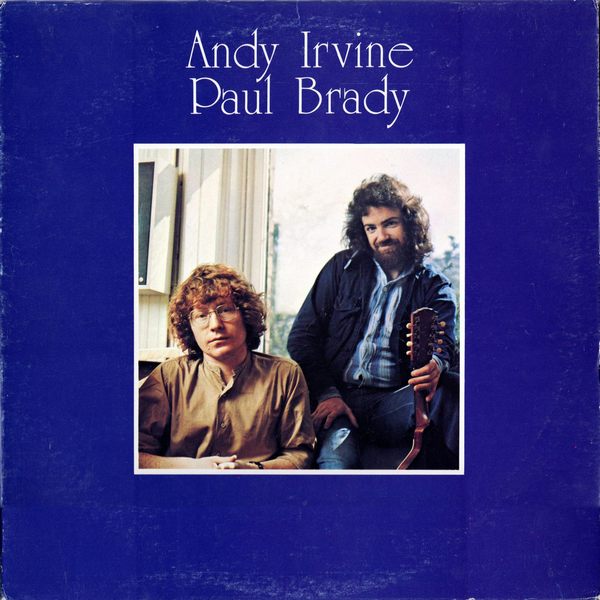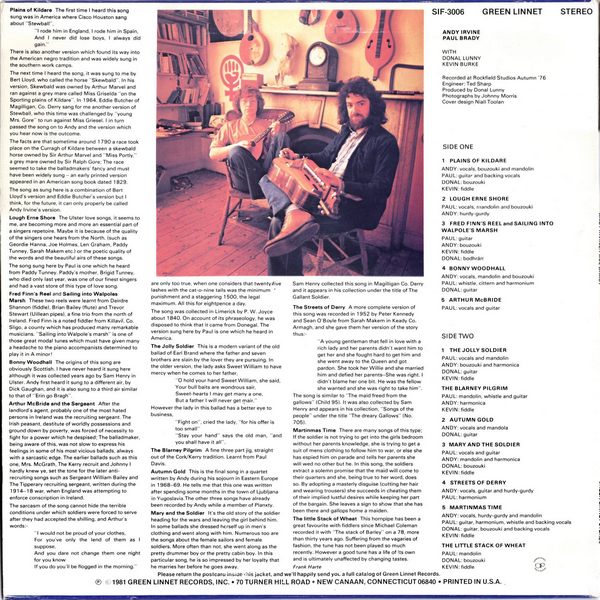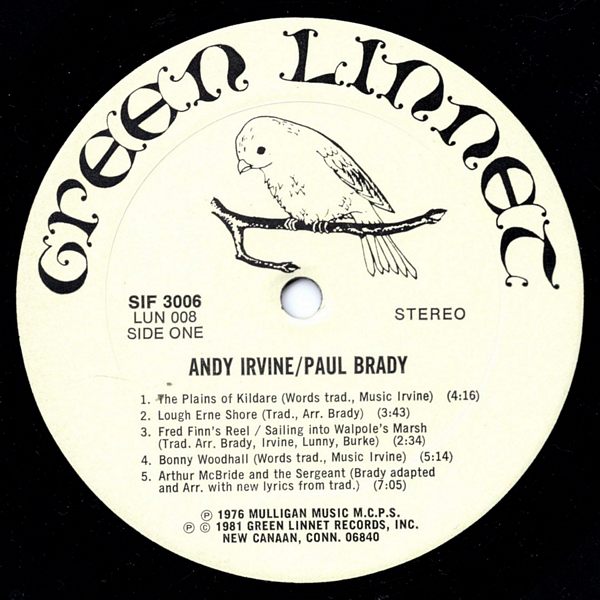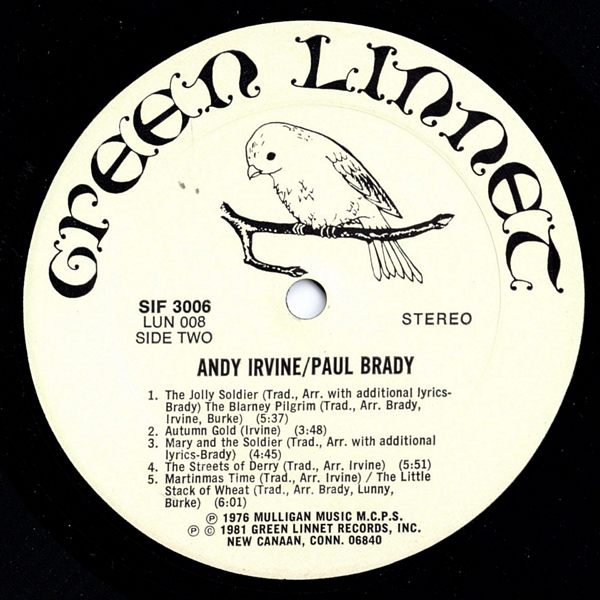

 |


 |
Sleeve Notes
Plains of Kildare
The first time I heard this song sung was in America where Cisco Houston sang about "Stewball".
"I rode him in England, I rode him in Spain,
And I never did lose boys, I always did gain."
There is also another version which found its way into the American negro tradition and was widely sung in the southern work camps.
The next time I heard the song, it was sung to me by Bert Lloyd, who called the horse "Skewbald". In his version, Skewbald was owned by Arthur Marvel and ran against a grey mare called Miss Griselda "on the Sporting plains of Kildare". In 1964, Eddie Butcher of Magilligan, Co. Derry sang for me another version of . Stewball, who this time was challenged by "young Mrs. Gore" to run against Miss Griese!. I in turn passed the song on to Andy and the version which you hear now is the outcome.
The facts are that sometime around 1790 a race took place on the Curragh of Kildare between a skewbald horse owned by Sir Arthur Marvel and "Miss Portly," a grey mare owned by Sir Ralph Gore; The race seemed to take the balladmakers' fancy and must have been widely sung — an early printed version appeared in an American song book dated 1829.
The song as sung here is a combination of Bert Lloyd's version and Eddie Butcher's version but I think, for the future, it can only properly be called Andy Irvine's version.
Lough Erne Shore
The Ulster love songs, it seems to me, are becoming more and more an essential part of a singers repertoire. Maybe it is because of the quality of the singers one hears from the North, ( such as Geordie Hanna, Joe Holmes, Len Graham, Paddy Tunney, Sarah Makem etc.) or the poetic quality of the words and the beautiful airs of these songs.
The song sung here by Paul is one which he heard from Paddy Tunney. Paddy's mother, Brigid Tunney, who died only last year, was one of our finest singers and had a vast store of this type of love song.
Fred Finn's Reel and Sailing into Walpoles Marsh
These two reels were learnt from Deirdre Shannon ( fiddle), Brian Bailey ( flute) and Trevor Stewart ( Uillean pipes), a fine trio from the north of Ireland. Fred Finn is a noted fiddler from Killavil, Co. Sligo, a county which has produced many remarkable musicians. "Sailing into Walpole's marsh" is one of those great modal tunes which must have given many a headache to the piano accompanists determined to play it in A minor!
Bonny Woodhall
The origins of this song are obviously Scottish. I have never heard it sung here although it was collected years ago by Sam Henry in Ulster. Andy first heard it sung to a different air, by Dick Gaughan, and it is also sung to a third air similar to that of "Erin go Braqh".
Arthur McBride and the Sergeant
After the landlord's agent, probably one of the most hated persons in Ireland was the recruiting sergeant. The Irish peasant, destitute of worldly possessions and ground down by poverty, was forced of necessity to fight for a power which he despised; The ballad maker, being aware of this, was not slow to express his feelings in some of his most vicious ballads, always with a sarcastic edge. The earlier ballads such as this one, Mrs. McGrath, The Kerry recruit and Johnny I hardly knew ye, set the tone for the later anti- recruiting songs such as Sergeant William Bailey and The Tipperary recruiting sergeant, written during the 1914-18 war, when England was attempting to enforce conscription in Ireland. The sarcasm of the song cannot hide the terrible conditions under which soldiers were forced to serve after they had accepted the shilling, and Arthur's words: —
"I would not be proud of your clothes,
For you've only the lend of them as I suppose,
And you dare not change them one night for you know
If you do you'll be flogged in the morning."
are only too true, when one considers that twenty five lashes with the cat-o-nine tails was the minimum punishment and a staggering 1500, the legal maximum. All this for eight pence a day.
The song was collected in Limerick by P. W. Joyce about 1840. On account of its phraseology, he was disposed to think that it came from Donegal. The version sung here by Paul is one which he heard in America.
The Jolly Soldier
This is a modern variant of the old ballad of Earl Brand where the father and seven brothers are slain by the lover they are pursuing. In the older version, the lady asks Sweet William to have mercy when he comes to her father,
"0 hold your hand Sweet William, she said,
Your bull baits are wondrous sair,
Sweet-hearts I may get many a one,
But a father I will never get mair."
However the lady in this ballad has a better eye to business,
"Fight on", cried the lady, "for his offer is too small"
"Stay your hand" says the old man, "and you shall have it ail".
The Blarney Pilgrim
A fine three part jig, straight out of the Cork/Kerry tradition. Learnt from Paul Davis.
Autumn Gold
This is the final song in a quartet written by Andy during his sojourn in Eastern Europe in 1968-69. He tells me that this one was written after spending some months in the town of Ljubljana in Yugoslavia. The other three songs have already been recorded by Andy while a member of Planxty.
Mary and the Soldier
It's the old story of the soldier heading for the wars and leaving the girl behind him. In some ballads she dressed herself up in men's clothing and went along with him. Numerous too are the songs about the female sailors and female soldiers. More often than not, she went along as the pretty drummer boy or the pretty cabin boy. In this particular song, he is so impressed by her loyalty that he marries her before he goes away.
Sam Henry collected this song in Magilligan Co, Derry and it appears in his collection under the title of The Gallant Soldier.
The Streets of Derry
A more complete version of is song was recorded in 1952 by Peter Kennedy and Seán O'Boyle from Sarah Makem in Keady Co, Armagh, and she gave them her version of the story thus: —
"A young gentleman that fell in love with a rich lady and her parents didn't want him to get her and she fought hard to get him and she went away to the Queen and got pardon. She took her Willie and she married him and defied her parents — She was right. I didn't blame her one bit. He was the fellow she anted and she was right to take him".
The song is similar to "The maid freed from the gallows" ( Child 95). It was also collected by Sam Henry and appears in his collection, "Songs of the people" under the title "The dreary Gallows" ( No. 705).
Martinmas Time
There are many songs of this type; If the soldier is not trying to get into the girls bedroom without her parents knowledge, she is trying to get a suit of mens clothing to follow him to war, or else she has espied him on parade and tells her parents she will wed no other but he. In this song, the soldiers extract a solemn promise that the maid will come to their quarters and she, being true to her word, does so. By adopting a masterly disguise ( cutting her hair and wearing trousers) she succeeds in cheating them of their implied lustful desires while keeping her part of the bargain. She leaves a sign to show that she has been there and gallops home a maiden.
The little Stack of Wheat
This hornpipe has been a great favourite with fiddlers since Michael Coleman recorded it with "The stack of Barley" on a 78, more than thirty years ago. Suffering from the vagaries of fashion, the tune has not been played so much recently. However a good tune has a life of its own and is ultimately unaffected by changing tastes.